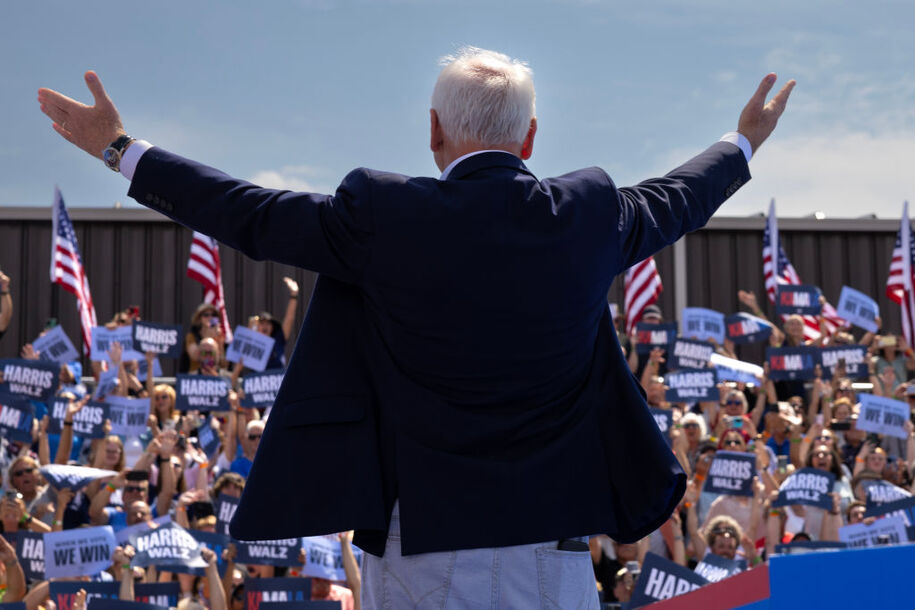Republicans are salivating over Tim Walz’s record, claiming the Minnesota governor is badly out of step with America. But as is so often the case, the GOP is engaged in projection: Walz’s vision is very popular. It’s Republicans who are out of touch.
Minutes after Kamala Harris’ campaign announced Walz as her running mate on the Democratic ticket, Donald Trump’s campaign released a statement smearing him as a “radical leftist” and “dangerously liberal extremist” who “has spent his governorship trying to reshape Minnesota in the image of [California].”
“This is a radical human being who comes from the far-left wing of the Democrat Party,” Trump running mate JD Vance echoed in Michigan this past Wednesday. It’s a caricature that Republican strategists are publicly salivating over, with one telling Politico last Tuesday, “That guy has done so much stuff [as governor], he’s just going to be a gift to the battleground states.”
But polling reveals Americans very much want laws like those Walz passed in Minnesota.
Walz was a marksman in the Army National Guard and hunts pheasants to this day. As recently as 2016, the National Rifle Association awarded him an “A” grade. But following the Las Vegas massacre in 2017, Walz donated his campaign contributions from the NRA to a veterans’ charity and endorsed universal background checks on gun buyers.
“The world’s changed. I’ve changed,” he said following the massacre at Marjory Stoneman Douglas High School in Parkland, Florida, a few months before he won the governorship in 2018.
After Democrats took majorities in the Minnesota legislature in 2022 for the first time in a decade, he signed new laws promoting gun safety. One measure requires background checks for all private firearm sales. Another allows the police to temporarily take firearms from people suspected of harming themselves or others, also known as a red flag law.
The NRA may have slapped Walz with an “F” in 2018, but these policies are overwhelmingly popular. Among registered voters, 87% support background checks and 80% support red flag laws, according to an April 2023 poll from Beacon Research and Shaw & Company Research on behalf of Fox News.
In the wake of the Supreme Court eliminating the federal right to abortion in 2022, Walz enacted a law protecting access to abortion and contraception, the latter of which Justice Clarence Thomas suggested shouldn’t be broadly legal. However, recent polling from Navigator Research shows Thomas is wildly out of step with the American public: 81% of voters support protecting access to contraception. And 63% of Americans want abortion to be legal in all or most cases, with only 8% thinking it should be illegal in all cases, according to Pew Research Center.
Walz also signed bills to implement universal paid family and medical leave (80% of registered voters support it), provide free breakfast and lunch to all public school students (74% of likely voters support it), and legalize recreational marijuana (70% of Americans support it).
In 2023, he approved a law that will provide free tuition to the state’s public colleges for students from families earning $80,000 or less a year, another popular policy. A June 2019 poll from Gallup found that 63% of Americans want to provide free tuition to state colleges for students from low- or middle-income families.
Walz even faced down the right’s trans-panic culture war, signing a bill to protect gender-affirming care for minors. Perhaps surprisingly, despite the nation’s polarization, Gallup found in May that 61% of Americans oppose banning minors from receiving such care. Only 36% endorse such a ban.
Walz has been governor for six years, and Republicans will no doubt try their best to weaponize his record against him. But the majority of Walz’s constituents have been happy so far with what he’s done in office. His job approval rating among Minnesota’s voters has stayed above 51% since the firm SurveyUSA began to poll it in December 2021. The most recent survey found Walz enjoying his best favorability yet, with 56% approving of him and only 40% disapproving—a net approval of 16 percentage points.
Republican leaders may try to peg him as an extremist or radical. But so far, to voters, he’s just a commonsense guy trying to give them what they want.
Campaign Action


